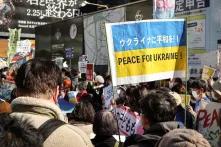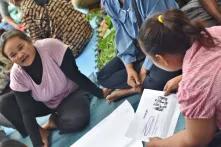On February 1, 2021, the Myanmar military conducted a military coup, tarnishing the nation's history with its notorious record of atrocities. Internationally infamous for its genocide of the Rohingya, the military has since then been striving to seize control of the state by resorting to arrests, torture, and killings of civilians.

The junta justified their coup by citing a supposed lack of credibility in the 2020 general election. However, both international and regional election monitoring groups unanimously attested to the transparency, freedom, and fairness of the general election, although some irregularities might have occurred. In their coup declaration, the military generals claimed to follow the 2008 constitution, attempting to legitimize their actions. By contrast, legal experts and pro-democracy activists have unequivocally deemed the coup as illegal.
The 2008 Constitution: Legitimizing Military Rule
Known as the 2008 Constitution or the Green Book due to its cover color, the 2008 constitution reinstated the former military dictator's generation (see info box). A significant provision of the 2008 constitution allows the military to seize power when deemed necessary. 25 percent of parliamentary seats are reserved for the Myanmar military without requiring any electoral process. Moreover, to bring about any changes to the 2008 constitution, more than 75% of the parliamentarians' support is required, followed by a nationwide referendum, in which more than 50% of eligible voters must show their approval. This has led legal scholars to consider it one of the most difficult constitutions globally to amend.
As per the 2008 constitution, elections are scheduled to be held every five years. Towards the end of 2010, the new generation of military dictators proclaimed the holding of elections, purportedly transforming Myanmar into a democracy. The first general election in 2010 saw victory for a military-backed right-wing party composed of former military generals, enabling them to form a government. During that election, Myanmar's influential party, the National League for Democracy (NLD), did not participate. Aung San Suu Kyi, the leader of the NLD and a contentious Nobel Peace Prize laureate known internationally, was detained under house arrest – she was only released after the installment of the military government.
In the 2015 general election, the NLD, led by Aung San Suu Kyi, achieved a resounding victory, reflecting their commitment to democracy and human rights. Suu Kyi successfully formed a civilian government but was barred from becoming the president due to constitutional provisions. Consequently, she served as a state counselor and the minister of foreign affairs.
In the 2020 general election, Aung San Suu Kyi and the NLD secured another victory in most constituencies. However, this time, the military generals denied her party the opportunity to form a government. On February 1, 2021, the Myanmar military launched a coup d'état on the same day as the first session of the parliament with the winning representatives from the third general election, etching this as the third military coup in Myanmar's political history.
Military Plans for Elections
The architect of the 2021 military coup was General Min Aung Hlaing, the commander-in-chief of the Myanmar Military. As he addressed the public, he repeatedly mentioned "We will hand over power after the election is held". But no one knows when the election will be held.
Presently, the new Election Commission has enacted a law for the registration of political parties. About 63 parties have applied for registration, and most of them are currently under scrutiny. If the registration process concludes, the Election Commission is expected to conduct the election within the following eight months.
The forthcoming election, which the dictators aim to organize, will entail selecting representatives through the Proportional Representation (PR) system, a departure from the winner-takes-all (First-past-the-post, FPTP) system used in the past ten years. "Regarding the newly changed PR system, how the laws and regulations will be enacted has not yet been announced. Therefore, we may face an election system that we have never faced before," People's Party Chairman U Ko Ko Gyi said in an interview with the media.
During the last election, there were 97 political parties listed. However, this time, around half of these parties have been deregistered and are opposing the election. Most of these parties prioritize democracy and human rights. Particularly, major political parties that won the highest number of votes in the last election have seen their leaders and members arrested or fleeing. Some face strict surveillance, while others participate in the revolution against the military dictatorship.
Resistance: Peaceful and Armed
As the junta continues its violent repression of the people while trying to hold elections to retain power, revolutionary forces are concurrently engaging in resistance against the military dictatorship, striving to establish a federal democratic system. Thus, the National Unity Consultative Council (NUCC) was formed, comprising members from political parties, elected MP in the last general election, ethnic revolutionary groups fighting for autonomy and rights, representatives from states and ethnic groups, as well as students, workers, youth, and women's groups. Primarily responsible for policy discussions, the NUCC led to the establishment of the National Unity Government (NUG), effectively creating a parallel government. The NUG seeks to implement federal democracy and has established the People's Defense Forces (PDF), an armed faction resisting the military dictatorship.
In addition, after peaceful demonstrations against the coup were countered with brutal force by the military, peaceful protesters joined armed revolutionaries. Members from various sectors, such as doctors, teachers, employees, and even some soldiers from the military and police, joined the Civil Disobedience Movement (CDM) to voice their dissent. CDM activists, at risk of arrest and imprisonment by the dictators, seek refuge in areas controlled by ethnic armed forces and along the Thai-Myanmar border. Additionally, some members of the Myanmar military and police are engaging in battles with armed forces against the military, collaborating with the People's Defense Forces.
In response to the resilient revolution, the Myanmar military is conducting extensive operations in regions where the resistance is strong. These operations involve the burning of towns and villages, mass killings of civilians, air raids, and artillery strikes on refugee camps, schools, hospitals, and religious buildings where those fleeing the war have sought refuge. These atrocities occur almost daily, causing immense suffering for the people of Myanmar.
The Institute for Strategy and Policy Myanmar reported that during the two years since the military coup, there have been armed conflicts in 205 out of 330 townships in Myanmar, resulting in over 9,300 battles. More than 2.5 million internally displaced war refugees and over 38,000 civilian homes and buildings destroyed underscore the scale of the devastation.
For instance, Thantlang, a city in Chin State bordering India and situated in northwest Myanmar, experienced months of destruction and burning after falling under the control of the Myanmar military. The city, housing about 1,800 houses and a population of over 10,000, forced the residents to flee and seek refuge at the Indian-Myanmar border.
Elections as a way out?
"If it is safe for security, there will be an election," the chairman of the Election Commission of the Military Council said during a meeting with some political parties, according to local media. However, due to the absence of peace and stability, the timing of elections remains uncertain. The lack of a limit on the number of voters required legalize the elections complicates the situation further.
"Since there is no peace and stability in the area, the election will not happen yet. But if they force it, it might happen. Because the law has no limit on how many voters must cast their votes to form a quorum," said U Aung Naing Oo, a former Mon politician. He was elected in the 2020 general election as a member of the Hluttaw as well as a former vice chairman of the Mon State Hluttaw.
He reiterated that if the election is to be held, campaigns that promote election awareness to the people, party offices can be opened freely, and the representatives can move freely in their campaign activities.
Political analysts believe that the current conflicts in Myanmar are the consequences of the military coup. However, in order to overcome this crisis, some political parties that have already registered with the current Election Commission have accepted that elections are the only way out.
"Whether the election is fair or unfair, whether there is public support is one part. And we are registering a party with the idea of how to shape a representative government out of the current crisis," said Dr. Aye Maung, chairman of the Rakhine National Leading Party, in an exclusive interview with BBC Burmese. He is considered by the Burmese community as a right-wing nationalist.
For the moment, the Myanmar military junta continues to hold power under the pretext that the current situation is in an abnormal situation and that the 2008 constitution does not refer to that phrase. Since elections will be held only when the country is under peace, it is not easy to predict when the elections will finally take place.


